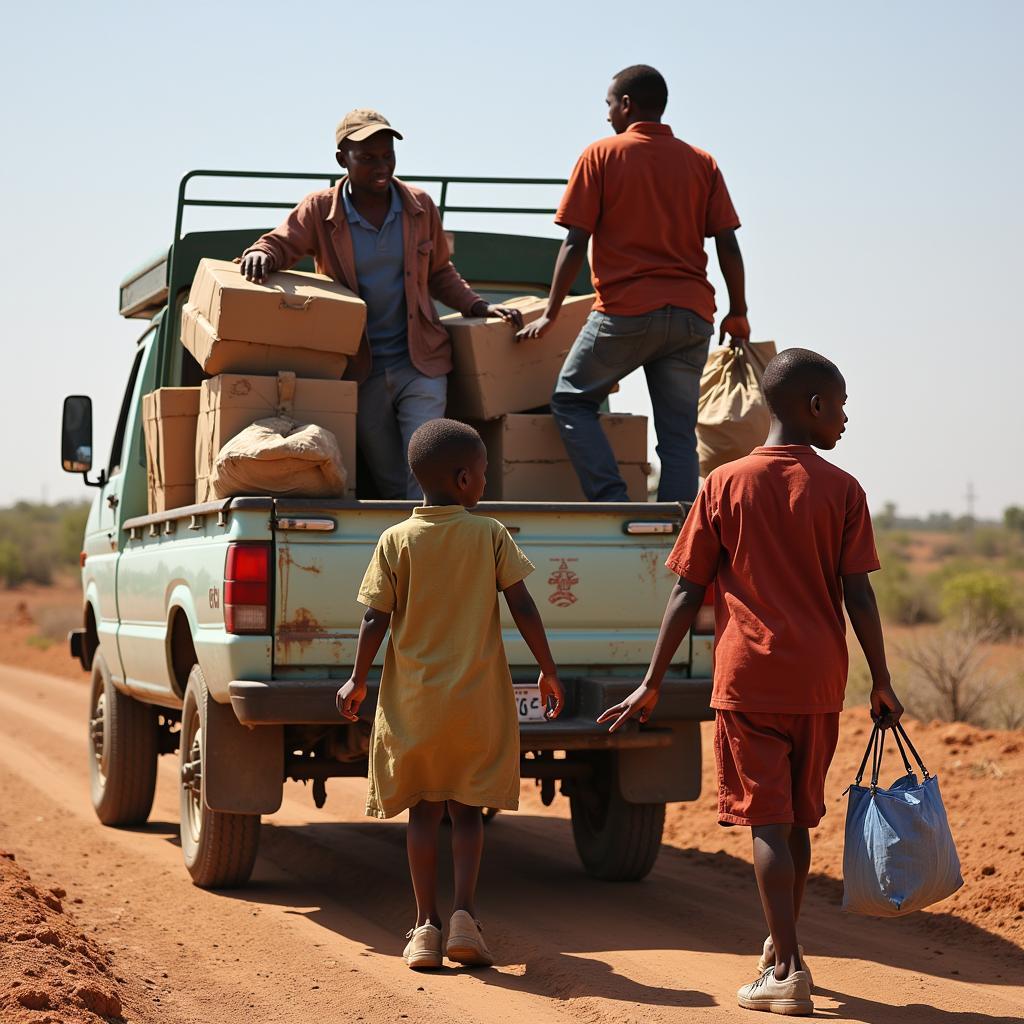Understanding the Complexities of African Asylum Seekers
African Asylum Seekers are individuals who have left their home countries in Africa and sought international protection in another country. Their journeys are often fraught with peril and driven by a complex interplay of factors, ranging from political persecution and armed conflict to economic hardship and environmental disasters. Understanding these multifaceted drivers is crucial to addressing the global asylum crisis effectively. Let’s delve deeper into the realities faced by these individuals.
Many African asylum seekers face significant challenges in their journeys, including dangerous crossings, exploitative smugglers, and hostile reception in host countries. Their experiences highlight the urgent need for comprehensive and humane solutions to address the root causes of forced displacement and provide adequate protection for those seeking refuge. For more information about those seeking refuge in Europe, you can read about African asylum seekers in Europe.
The Multifaceted Drivers of Asylum Seeking from Africa
Several interconnected factors contribute to the increasing number of African asylum seekers. Political instability, marked by authoritarian regimes, human rights abuses, and violent conflicts, often forces individuals to flee their homes in search of safety. Economic hardship, exacerbated by poverty, unemployment, and lack of opportunities, further compels people to seek better prospects elsewhere. Additionally, environmental disasters, such as droughts, floods, and desertification, displace communities and contribute to migration flows.
Political Persecution and Armed Conflict
In many African nations, political persecution and armed conflict are the primary drivers of asylum seeking. Individuals facing targeted violence, imprisonment, or threats due to their political beliefs, ethnicity, or religion are often forced to flee to protect their lives and freedom. Ongoing conflicts and civil wars create unstable and dangerous environments, displacing entire populations and forcing them to seek refuge across borders.
For more context on the experiences of African asylum seekers in Germany, see African asylum seekers in Germany.
Economic Hardship and Lack of Opportunities
While political instability and conflict are significant drivers, economic hardship and lack of opportunities also play a crucial role. Poverty, unemployment, and limited access to education and healthcare push many Africans to seek better lives elsewhere. The desire for economic stability and a brighter future for their families motivates them to embark on perilous journeys, often with the hope of finding work and sending remittances back home.
 African Asylum Seekers Facing Economic Hardship
African Asylum Seekers Facing Economic Hardship
Environmental Disasters and Climate Change
The increasing frequency and intensity of environmental disasters, exacerbated by climate change, are also contributing to displacement and asylum seeking in Africa. Droughts, floods, and desertification destroy livelihoods, displace communities, and create food insecurity, forcing people to migrate in search of survival. These environmental challenges add another layer of complexity to the already intricate dynamics of migration in Africa.
Challenges Faced by African Asylum Seekers
The journey undertaken by African asylum seekers is often fraught with danger and uncertainty. They frequently face perilous journeys across deserts and seas, relying on exploitative smugglers who prioritize profit over human safety. Upon arrival in host countries, they often encounter hostile reception, bureaucratic hurdles, and discrimination, making integration a challenging process.
You can learn more about the specific challenges faced by African asylum seekers in the UK by reading African asylum seekers in UK.
Navigating Complex Asylum Systems
The asylum systems in many countries are complex and often overwhelmed, leading to lengthy processing times and uncertainty for asylum seekers. Navigating the legal procedures, providing sufficient evidence to support their claims, and dealing with language barriers can be incredibly challenging.
Integration Challenges in Host Countries
Even after being granted asylum, many African asylum seekers face significant integration challenges in their new host countries. Language barriers, cultural differences, and discrimination can hinder their ability to find employment, access education, and fully participate in society. Building a new life in a foreign land can be a long and arduous process.
For specific examples of the challenges and community support for asylum seekers, read about African asylum seekers Portland Maine.
Conclusion: A Call for Global Action
The issue of African asylum seekers requires a comprehensive and multifaceted approach that addresses the root causes of forced displacement. Promoting peace and stability, fostering economic development, and addressing climate change are crucial steps towards reducing the need for people to flee their homes. Furthermore, ensuring that asylum systems are fair, efficient, and humane is essential to providing protection and support for those seeking refuge. The international community must work together to find sustainable solutions that uphold the dignity and rights of all individuals. African asylum seekers deserve the chance to rebuild their lives in safety and security.
FAQ
- What are the main reasons why people seek asylum from Africa?
- What challenges do African asylum seekers face during their journey?
- How can the international community help address the root causes of forced displacement?
- What are the common misconceptions about African asylum seekers?
- How can host countries better support the integration of asylum seekers?
- What role does climate change play in driving migration from Africa?
- What are some success stories of African asylum seekers integrating into new communities?
Common Scenarios & Questions
- Scenario: A young family fleeing conflict in their home country arrives in a new country and needs to apply for asylum. Question: What are the steps they need to take to apply for asylum, and what kind of support is available to them?
- Scenario: An asylum seeker has been granted refugee status and is now looking for work. Question: What resources are available to help them find employment and integrate into the workforce?
- Scenario: A community wants to support newly arrived asylum seekers. Question: How can they get involved and what kind of assistance is most helpful?
Further Reading & Related Topics
You may be interested in learning more about the African Economic Community and its role in regional integration: African economic community type of economic integration.
Call to Action
For assistance with asylum-related matters or if you have any questions, please don’t hesitate to contact us:
Phone: +255768904061
Email: kaka.mag@gmail.com
Address: Mbarali DC Mawindi, Kangaga, Tanzania.
Our dedicated customer support team is available 24/7 to provide assistance and answer your inquiries.


